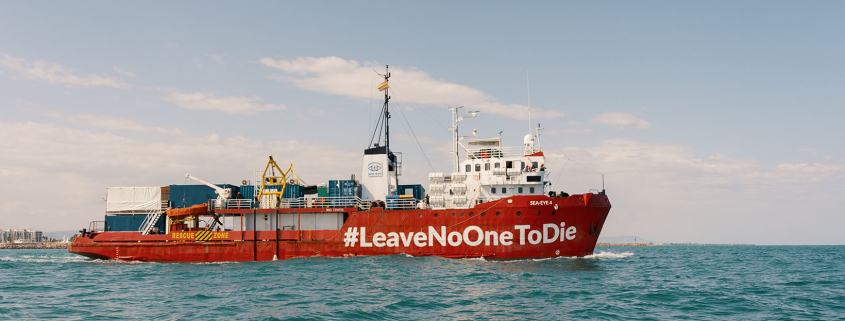Rescue ship SEA-EYE 4 departs on last mission of the year
New legal opinion underlines the risk of criminalisation of sea rescue by a draft law of the German government
The rescue ship SEA-EYE 4 left the Italian port of Taranto on Friday night (8 December 2023) and set off on its last mission of the year. This is the ship’s fifth mission of the year. One of a total of three detentions of the ship led to the cancellation of a mission. Sea-Eye appealed against all three detentions before Italian administrative courts. A decision by the courts is still pending in all three cases.
Andreas Krahl, a member of the Bavarian state parliament and nurse, is also on board. This is the second time he has spent the month of December on board the SEA-EYE 4. Krahl is part of the joint medical team of German Doctors e.V. and Sea-Eye e.V. in the on-board hospital of SEA-EYE 4. The Bonn-based aid organisation German Doctors has been working with Sea-Eye for three years and is once again providing the on-board doctor Nour Hanna as medical director of the mission.
“The humanitarian situation at Europe’s external borders is deteriorating. This year, at least 2,500 people have already died while fleeing across the Mediterranean. Our last joint mission with the SEA-EYE 4, in which four people could only be rescued dead, once again brought this sad fact clearly to our eyes. It is therefore all the more important that an experienced doctor from German Doctors, Nour Hanna, is once again on board on this last mission of the SEA-EYE 4 this year. As a paediatrician, she already volunteered on the SEA-EYE 4 last year before Christmas and is also familiar with the situation of refugees in Greece. She also cared for patients at our medical centre in Thessaloniki as a German Doctor. We are very grateful to her and the entire crew for their important volunteer work and wish everyone involved all the best for the mission,” says Dr Harald Kischlat, member of the board of German Doctors e.V.
While the crew of the SEA-EYE 4 is on its way to the operational area, the German Bundestag is discussing the so-called Repatriation Improvement Act. It provides for an amendment to Section 96 of the Residence Act. A new legal opinion by Prof. Dr Aziz Epik (University of Hamburg) and Prof. Dr Valentin Schatz (Leuphana University of Lüneburg) expressly warns of the danger of criminalising civilian sea rescuers through the draft law presented by the Federal Ministry of the Interior.
“The amendment of Section 96 (4) of the Residence Act proposed by the Federal Ministry of the Interior, which will extend to cases of altruistic assistance for unauthorised entry, poses the risk that civilian sea rescuers will be criminalised. Section 96 (4) of the Residence Act refers to the law of the European country of entry, for example Italy, for the question of the unauthorised nature of the entry. We consider that at least some of the rescued people will formally enter the country of disembarkation (for example, Italy) without formal authorisation. Accordingly, Section 96 (4) of the Residence Act would apply. That said, in our opinion, the conduct of civilian sea rescuers during the rescue operation and the transfer of people to a port of disembarkation would be justified as a state of emergency under Section 34 StGB. However, this view is not undisputed and it is also not sufficient to include a corresponding intention of the legislator in the explanatory memorandum to the law, as law enforcement authorities and criminal courts are not bound by such an explanation. We therefore advocate to incorporate at least an explicit exception to the offence in Section 96(4) of the Residence Act, as is already permitted under European law pursuant to Directive 2002/90/EC for all forms of humanitarian assistance,” says Prof. Dr Valentin Schatz, Junior Professor of Public Law and European Law at the Leuphana University of Lüneburg.
In the past, Italian and Maltese authorities have repeatedly questioned whether a distress case involving people fleeing in the Mediterranean is a distress case at all. For example, the Maltese Rescue Coordination Centre asked merchant ships such as the MTS Southport in December 2022 not to rescue people and to change course. The people later rescued by the SEA-EYE 4 included seriously injured people who would not have survived the crossing to Italy.
“In precisely such a case, the draft law makes it possible to initiate criminal proceedings against the Sea-Eye crew. Because if a European authority does not recognise an emergency at sea as such, but the SEA-EYE 4 rescues the people from acute life-threatening danger and then disembarks them in a European port, the German public prosecutor’s office would at least have to investigate whether Sea-Eye acted in accordance with the law and initiate investigations against our crew. This draft law must not come into force because it criminalises crew members and discourages them from providing humanitarian aid on a rescue ship. The Italian strategy of criminalising and frightening sea rescuers must not become the legal standard in Germany,” says Gorden Isler, Chairman of Sea-Eye e.V.

 Soizic Roux
Soizic Roux
 Leon Salner
Leon Salner